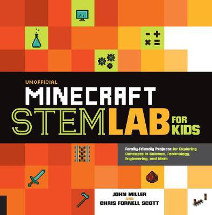Unofficial Minecraft STEM lab for kids by John Miller and Chris Fornell Scott

Quarry Books, 2018. ISBN 9781631594830
Apparently, 74 million people play Minecraft each month, one of
those is Miss 12 who is now hooked on coding, and many of whom are
in schools where the game is being used in many scenarios as part of
the everyday learning experience. For some time, the teacher
librarian networks I belong to have been peppered with queries about
how it can best be used and so a book that specifically focuses on
its use in the science, technology, maths and engineering strands
will be of great value to teachers whose students are clamouring for
these sorts of experiences but whose personal knowledge and skills
of the game are not as developed as those of those they teach.
Beginning with a thorough explanation of what Minecraft is, how it
works, how it can be used and played and purchased so that parents
and teachers understand its value both in school and beyond - the
book's focus is 'to connect the Minecraft player(s) in their life
with STEM learning... to help bridge the gap between game-play
and engaging STEM concepts" - it moves on to six themed quests, each
of which presents four labs, which, in turn, have two parts - an
out-of-game activity that requires hands-on exploration and an
in-game building and crafting activity.
Quest 1: Pistons, Rails, and Redstone
Quest 2: Construction Zone
Quest 3: The Sky is Not Your Limit
Quest 4: Rocks, Minerals, and Gems
Quest 5: Cycles in Science
Quest 6: Engineering Challenge
In terms of the quality of content, Miss 12 would probably be a
better reviewer than I, but in her absence, this review
by a Minecraft expert suggests that it is "outstanding" and gives a
comprehensive tour of the contents and layout. The credentials of
the authors also convince me of its authority. However, as a
non-Minecraft person who wears a teacher's hat, it would seem to me
to be the perfect tool to not only capture an audience who prefer
gaming to reading but also to use its user-friendliness to explore
things not necessarily intellectually or physically in the teacher's
toolbox. Added to that is this
article which shows that onscreen adventures are leading
children to discover their origins in print.
I'm beginning to see what all the conversations have been about and
why there is such excitement about this game that demands so much
more of the student than pressing buttons or manipulating levers.
Barbara Braxton